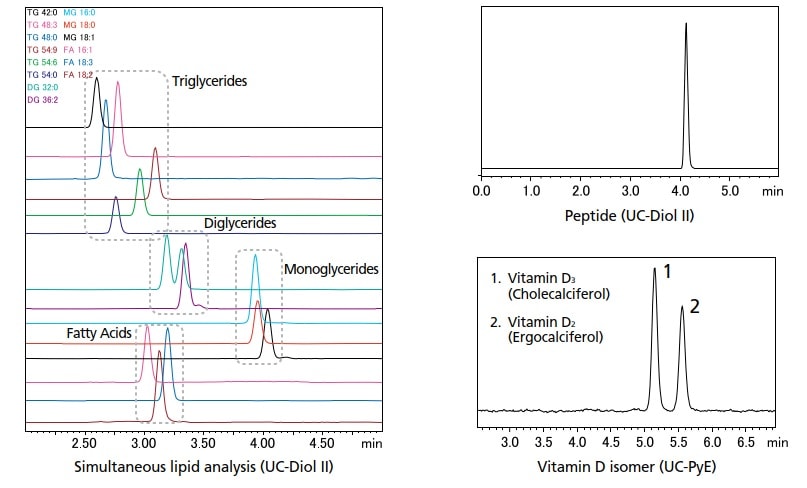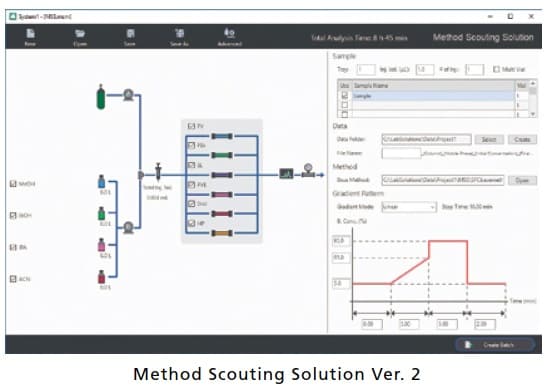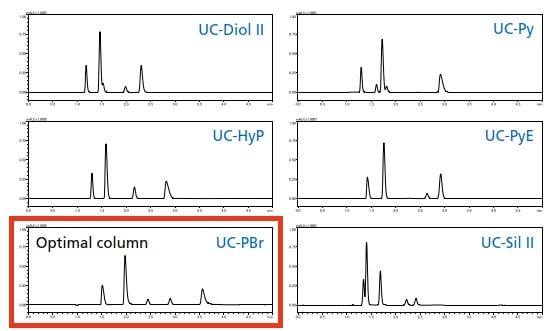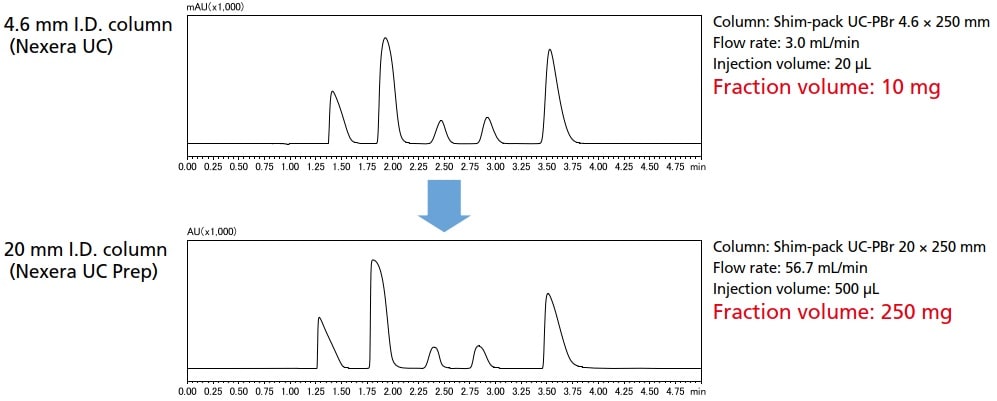Nexera UC Prep - Columnas
Semi-Preparative Supercritical Fluid Chromatography System
- Descripción general
- Características
- Aplicaciones
- Especificaciones
- Descargas
- Configuración
- Columnas
- Soporte
Extensive column lineup opens up analysis options
Shim-pack™UC series columns are designed specically for Nexera UC series SFC systems. When using supercritical fluids for analysis, retention behavior can vary significantly depending on the type of stationary phase. To optimize separation, a variety of columns should be used to determine which phase gives the best resolution in the shortest time. The extensive choice of column sizes available means that operations can be scaled up seamlessly from analytical SFC to preparative SFC.
| Functional group | 4.6 × 250 mm | 10 × 250 mm | 20 × 250 mm | 28 × 250 mm | |
|---|---|---|---|---|---|
| Shim-pack UC-DiolⅡ | Diol | 227-32606-02 | 227-32606-03 | 227-32606-04 | 227-32606-05 |
| Shim-pack UC-Sil Ⅱ | ー | 227-32607-02 |
227-32607-03 |
227-32607-04 |
227-32607-05 |
| Shim-pack UC-HyP | 3-Hydroxphenyl |
227-32600-02 |
227-32600-03 |
227-32600-04 |
227-32600-05 |
| Shim-pack UC-Py | Pyridinyl |
227-32601-02 |
227-32601-03 |
227-32601-04 |
227-32601-05 |
| Shim-pack UC-PBr | Pentabromobenzyl |
227-32602-02 |
227-32602-03 |
227-32602-04 |
227-32602-05 |
| Shim-pack UC-Choles | Cholesteryl |
227-32603-02 |
227-32603-03 |
227-32603-04 |
227-32603-05 |
| Shim-pack UC-PyE | Pyrenylethyl |
227-32604-02 | 227-32604-03 |
227-32604-04 |
227-32604-05 |
| Shim-pack UC-Triazole | Triazole | 227-32605-02 | 227-32605-03 | 227-32605-04 | 227-32605-05 |
Choosing a column
Since normal phase is the main separation mode used for SFC, normal phase UC-Diol II columns are commonly used. UC-Diol II columns can be used for analyzing a wide variety of compounds, from phospholipids to highly-polar peptides. UC-Py columns exhibit similar behavior to ethylpyridine-based columns, and also display very versatile performance.
In addition, UC-HyP columns can uniquely separate lipids by class. Columns with multiple interaction modes can improve separation of isomers or compounds that are difficult to separate by LC. Prime candidates include the UC-Choles, which contains a cholesteryl group, the UC-PyE, with strong π–π interactions, and the UC-PBr, which applies a dispersion force to Br.

Ideal for column scouting
In HPLC analysis, water-based mobile phases are generally used for reversed phase analysis, and non-water based mobile phases for normal phase analysis. However, in SFC analysis a mixture of supercritical carbon dioxide and a modifier (an organic solvent such as methanol) is used as the mobile phase, regardless of the stationary phase. This means the same mobile phase composition can be used for successive analysis with all columns.
Method scouting for optimization of separation conditions and scaling up to preparative size

For high-purity isolation, target peaks need to be adequately separated, for which the user must determine optimum column and separation parameter settings (method scouting). The Nexera UC chiral screening system and dedicated Method Scouting Solution software can be used to screen columns more quickly and accurately (Step1). Once the optimum column has been identified, smoothly scale up to preparative scale flow rates, preserving the peak separation while increasing the mass load (Step 2).

Step1 Method scouting at analytical scale
Method scouting is easy even for first-time users — simply execute the batch table generated automatically by the dedicated software. The system can automatically switch between different settings to run the scouting process continuously day or night, even for multiple modifiers and columns. Various types of data can be displayed in the data browser and multi-data reports generated with resolution values for all data to assist in evaluating separation conditions.
Step2 Scaling up
Using a Shim-pack UC series column enables you to increase mass load while maintaining separation performance. The optimum preparative column determined from Step 1 can be used to scale up the column size, flow rate and injection volume based on the desired fraction volumes.

LC Columns
-
When conducting analysis with the Nexera UC supercritical fluid chromatography system, because diffusion of the sample band in the mobile phase is high compared with liquid chromatography, separation behavior changes significantly depending on the types of columns used.
- Descripción general
- Características
- Aplicaciones
- Especificaciones
- Descargas
- Configuración
- Columnas
- Soporte



